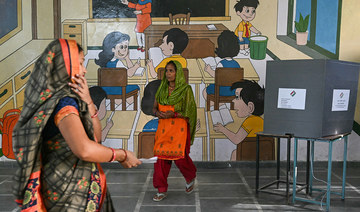NEW DELHI: Voter numbers have slumped in the first and second phase of India’s general election, with experts saying that the “wave” of enthusiasm that brought incumbent Prime Minister Narendra Modi to power in 2014 was no longer present in the ongoing polls.
More than 968 million people have been registered to vote in the world’s biggest general election, in which Modi and his Hindu nationalist Bharatiya Janata Party are aiming for a rare third consecutive term in power.
The first phase of voting was on April 19 and the polls are taking place over six weeks, with results expected on June 4.
India has a total of 28 states and eight federally governed territories. Some regions complete the process on a single day, while others spread it out over several phases.
The second phase was on April 26 and the other voting dates will be May 7, May 13, May 20, May 25 and June 1.
Friday’s turnout was estimated by the Election Commission of India at 61 percent — compared with 68 percent in the second phase five years ago. In the first phase, it was 65 percent against nearly 70 percent in 2019.
The lower turnout showed “apathy toward politics,” D. Dhanuraj, chairman of the Kerala-based Center for Public Policy Research, told Arab News.
“I think it is clear now that there is no wave in favor of any party as such. In 2014, there was a wave, in 2019 there was a wave,” he said, referring to the enthusiastic pro-Modi balloting in the past two general elections.
“(In) 2024, there was a talk that there was a wave, but I think it is becoming clear that there is no such wave, no wave that would give exponential majority in the parliament to any party.”
Modi and his BJP-led National Democratic Alliance are challenged by an alliance of two dozen opposition parties — the Indian National Developmental Inclusive Alliance, or INDIA — led by the Congress party, which has ruled the country for close to 45 years since independence in 1947.
Congress plunged to a historic low when it was swept out of power by the BJP in the 2014 and 2019 general vote, and won its second-lowest number of 52 seats in 2019, when Modi’s party enjoyed a landslide victory, winning 303 out of 543 seats in the lower house of parliament.
The party or coalition that wins at least 272 parliamentary seats forms the government.
In 2024, Modi has been aiming for 400 seats for the National Democratic Alliance led by his BJP. But the target, often cited ahead of the first phase, has not been repeated.
Although pre-poll surveys suggested Modi would easily win, it is no longer projected to be a landslide as in in the two previous elections.
“It was the electoral rhetoric of the BJP to cross 400 seats, but this reality is not happening, it seems now,” Satish Kumar Singh, political analyst in Delhi, told Arab News.
“The BJP gave that slogan just to galvanize voters. When there is less voting that also means that the BJP might not have a whopping majority, it might be close to a simple majority.”
Another factor deterring voters from standing in long queues at polling stations was the hotter-than-normal summer, with temperatures in some states on Friday exceeding 40 degrees Celsius.
“There is no wave but heatwave in this election,” Singh said. “That is keeping the voters away from the polling booths.”
Not all experts expected the lower turnout to affect the ruling party’s chances in the polls.
“There seems to me no empirical evidence that if voter turnout increases it supports any side — the ruling (party) or the opposition,” said Sandeep Shashtry, political analyst and vice-chancellor of Jagran Lakecity University in Bhopal.
“I think we cannot make a generalization about the wider implications.”
Voter turnout slumps, Modi ‘wave’ missing from India’s 2024 polls
https://arab.news/m8yqp
Voter turnout slumps, Modi ‘wave’ missing from India’s 2024 polls

- India’s general election started on April 19 and is taking place in seven phases till June 1
- Voters are battling extreme temperatures as parts of India gripped by heatwave

























